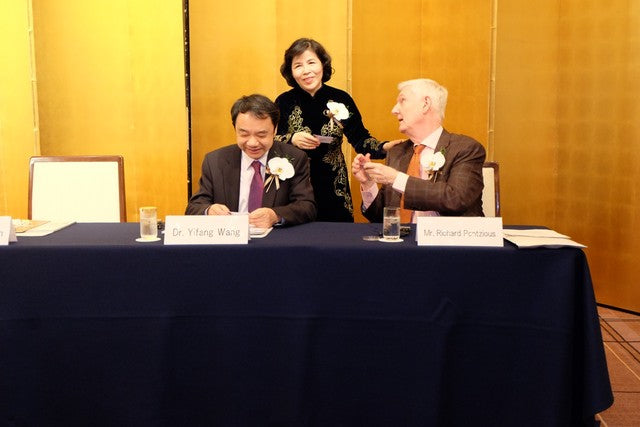
Vinamilk CEO picks up Nikkei Asia Prize
Share

Left to right: Richard Pontzious, artistic director and conductor of the Asian Youth Orchestra; Mai Kieu Lien, chairwoman and CEO of Vietnam Dairy Products (Vinamilk); and Wang Yifang, director of the Institute of High Energy Physics, Chinese Academy of Sciences, appear at the awards ceremony for the 20th Nikkei Asia Prizes on May 20 in Tokyo.
TOKYO -- A Vietnamese dairy queen, a Chinese scientist and a legendary Hong Kong orchestra have taken out this year's Nikkei Asia Prizes. The awards, now in their 20th year, are to honor those who are making a difference in the Asian region.
Speaking at the awards ceremony in Tokyo on Wednesday, the Chairwoman and CEO of Vietnam Dairy Products (Vinamilk) Mai Kieu Lien, who won the economic and business innovation category, said: "We are motivated and determined to becoming Vietnam's No.1 symbol of nutritional and healthy products."
Vietnam's dairy industry was nonexistent until just a few years ago. In 1990, annual milk consumption was just half a liter. In 2006, Vinamilk launched the country's first large-scale dairy farm and now the company is Vietnam's largest food producer. It is also branching out internationally. "Vinamilk has grown rapidly and sustainably with a compound annual growth rate (CAGR) of 22% per year in terms of revenues and profits," Lien said.
Lien has decided to donate her 3 million yen ($24,816) prize money to the United Nations Children's Fund (UNICEF) to provide relief for children in Nepal following the recent major earthquakes. ''It is my personal desire as well as Vinamilk's business culture to do our best for a better future for children in Vietnam and around the world," said Lien in her acceptance speech at the Imperial Hotel.
Mysterious world of neutrinos
Wang Yifang, director of the Institute of High Energy Physics at the Chinese Academy of Sciences won the science, technology and environment category. Wang lead an experiment aimed at solving one of the last remaining mysteries about neutrinos, a type of subatomic particle. He is said to be China's leading candidate for a Nobel Prize.
"My work is about fundamental particles," the professor began his acceptance speech. "We now understand that our world is made up by only 12 types of elementary particles. Among them, three are neutrinos." His research pursued the third and final neutrino oscillation, theta-13, which is yet to be known.
"We proposed an experiment near the Daya Bay nuclear power plant in the south of China, and we managed to secure funding from the Chinese government, the U.S. government, and those of other countries and regions."
In March 2012, just two and a half months from the start of the experiment, his team announced the first results, concluding with very high confidence, that a new type of neutrino oscillation represented by theta-13, does exist. "The result shocked the [scientific] community since it came unexpectedly fast," he said.
"Now we are working on a next generation neutrino, collaborating with up to 60 institutions from 10 countries. Basic science not only brings us technological revolution and a better life, but it can also bring us a better, cooperative world. International collaboration is a must," he said.
Making music
The Asian Youth Orchestra, now in its 25th year, took out the culture and community category. Each year 100 young musicians are picked to join the ensemble and tour the world with renowned conductors and soloists.
Richard Pontzious, the artistic director and conductor reflected on the group's history. "Close to a thousand candidates try out each year; a staggering 22,000 applicants over the years," he said. "The successful 100 each year, study with master professionals from the great orchestras of the world -- the Boston, Baltimore, Chicago, Minnesota and San Francisco symphony orchestras, the Bergamo Italy Festival Orchestra, Milan's La Scala Opera, the Vienna Volksoper, Brussels' Monnaie Opera, the Triple Helix Trio and the Boston and Peabody music conservatories -- these intense weeks of study and rehearsal capped by three weeks on tour performing in the great concert halls of the world."
He thanked the panel of judges for "recognizing the organization not only for the music we make, but our work as cultural ambassadors across East and Southeast Asia, as well, acknowledging the power of music, the power of friendships and the power of pride in mutual achievement."
The Nikkei Asia Prizes were created in 1996 to commemorate the 120th anniversary of Nikkei Inc.'s main Japanese-language newspaper, The Nikkei. Past winners include Professor Yuan Longping, China's father of hybrid rice (1996); Dr. Manmohan Singh, then-member of parliament and later prime minister of India (1997); and Dr. Muhammad Yunus, managing director of Grameen Bank (2004), who went on to receive the Nobel Peace Prize in 2006.
Source: nikkei-events.jp/asiaprizes/